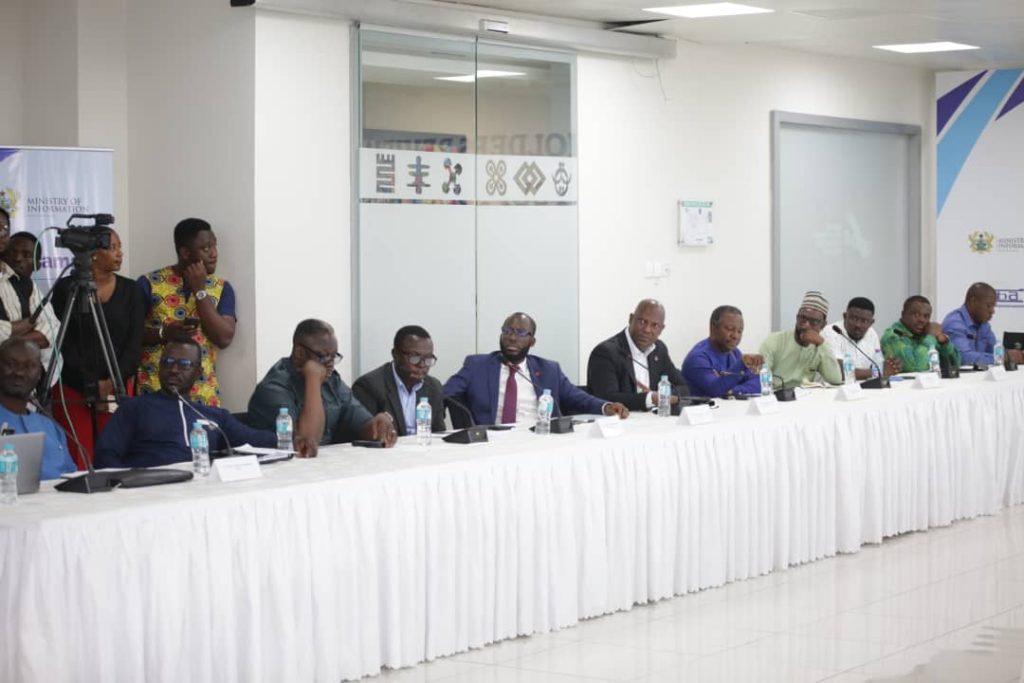By Godwill Arthur -Mensah
Accra, Nov. 7, GNA–Participants at the Review Meeting on Media Support Programme have called for review of the course content in order to meet the specific needs of the media organisations.
They said the course outline being implemented by the Ministry of Information under its Media Capacity Enhancement Programme should be tailored to meet the specific needs of both state-owned and private media organisations, since each has defined roles to play in the media landscape.
Media managers, editors, media practitioners,academia and student journalists made the call in Accra on Tuesday at a meeting convened by the Ministry of Information.
The meeting was to access the impact of the Media Support programme three years after its implementionand take feedback and suggestions to make it more effective and responsive to the media landscape.
Professor Audrey Gadzekpo, the Dean of the School of Information and Communication Studies, University of Ghana, who chaired the meeting, said journalists and media outlets should develop strong culture of authenticating sources of Information before publication to avoid misinforming the public.
She was of the opinion that a “Trainer-of-Trainers” would be the best option for the programme, which would enable the senior media practitioners or journalists to receive the initial training and subsequently train the rest of the journalists in their media houses.
In that regard, she advocated the need to deploy senior journalists for such training instead of junior ones or national service persons.
Prof. Gadzekpo appealed to the Government to provide adequate funding to the Ministry of Information to enable it to upscale the training across the country.
She called for retention of the trainees in their respective media organisations so as to impart the knowledge to their colleagues.
Since its inception in 2019, less than 100 journalists have received training under the Media Capacity Enhancement Programme.
The Minister of Information, Mr Kojo Oppong Nkrumah, said his Ministry was keen and committed to institutionalising the programme to promote professional and ethical journalism in Ghana.
He said in 2018 when he took over the leadership of the Ministry, he tasked the Research and Policy Units to provide data on the key issues in the public communication ecosystem, which required attention.
Thus, after the findings, it became necessary to build the capacity of media practitioners to improve on the professional and ethical practices.
Aside its mandate of being the mouthpiece of the Government, the Ministry was also required to support the public communications ecosystem in the country.
“To effectively support the ecosystem it was important to start with baseline data on the key issues that needed attention, ” he said.
“My attention was drawn to the following: the safety of journalists, the capacity of persons practicing journalism, and ensuring that egregious media content was contained on our airwaves.”
Subsequent to that, the Ministry invited stakeholders to a validation forum in early 2019 at the Alisa Hotel to discuss draft programmes designed to respond to some of those issues.
The feedback from the forum, he said, culminated in the final development of the Media Support Programme, which were signed off and advertised in the first-ever programmes handbook of the Ministry, issued to staff in 2019.
They comprised
Coordinated Mechanism for the Safety of Journalists,
Media Capacity Enhancement Program, and
Collaboration with stakeholders to contain egregious media content.
Earlier this year, Mr Oppong Nkrumah said the Ministry added campaigns to combat misinformation and disinformation in the media landscape.
“It has been three years since we commenced our media support programs and a few salient questions are ripe for answers at this time.”
“How well are our media support programs known by the stakeholders, the country, and our partners?”
“What has been the result of implementation so far?

What are the key challenges that these programs face and how can we resolve them?”
“How much support are we garnering for these programs from our stakeholders and partners?”
“How do we institutionalise these programs to outlive the current executive administration?”.
Mr Oppong Nkrumah was hopeful that the views, input and feedback from the participants would aid in improving the programme going forward.
“My administration at the Ministry of Information is keen and committed to institutionalising the media support programmes and in particular the collaboration with stakeholders in the sector to shape and execute them.”
Contributing to the discussion, Mr Samuel Nartey George, the Member of Parliament for Ningo-Prampram, and Ranking Member on Parliamentary Select Committee on Communications, said misinformation and disinformation posed the greatest threat to Ghana’s democracy going into the 2024 General Election.
He, therefore, called for collective efforts by all stakeholders to tackle it head-on.
GNA